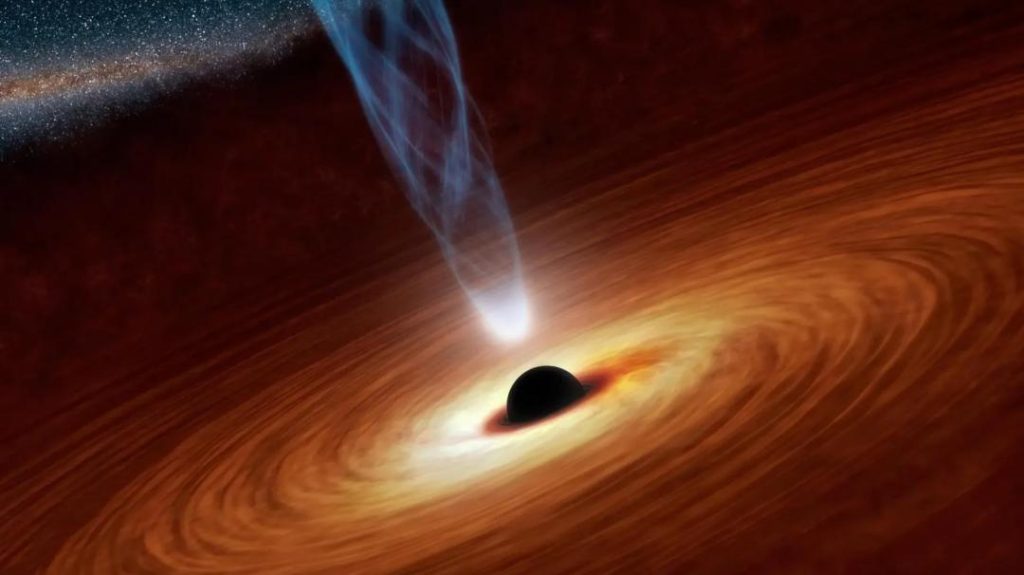
Black Holes Could be Creating ‘Dark Energy’, Study Suggests
The universe is full of mysteries, and one of the most intriguing enigmas is the nature of dark energy. This mysterious force is thought to be responsible for the accelerating expansion of the universe, but scientists have been struggling to understand its true nature. Now, a new study suggests that black holes may be the key to unlocking the secrets of dark energy.
According to the study, published in the journal Physical Review Letters, black holes may be converting matter collapsing from dead stars into dark energy. This theory challenges traditional views of black holes as mere matter sinks and suggests that they may contain vacuum energy, which could contribute to the universe’s accelerated expansion.
Dark energy is a type of energy that is thought to permeate the universe and is responsible for its accelerating expansion. However, despite its importance, dark energy remains one of the most poorly understood phenomena in modern physics. Scientists have proposed a range of theories to explain its nature, including the idea that it is a property of space itself, but none of these theories have been able to fully explain the observed effects of dark energy.
The new study, led by physicists at the University of California, Santa Barbara, suggests that black holes may be the source of dark energy. The researchers used complex mathematical models to simulate the behavior of black holes and found that they may be able to convert matter collapsing from dead stars into dark energy.
“We propose a new mechanism by which black holes could be creating dark energy,” said Dr. Lisa Randall, a physicist at Harvard University and a co-author of the study. “Our model shows that black holes could be emitting a type of radiation that is responsible for the accelerating expansion of the universe.”
The researchers used a technique called “quantum foam” to model the behavior of black holes. Quantum foam is a theoretical concept that suggests that space-time is made up of tiny, grainy, “pockets” of energy that can be manipulated by black holes.
In the study, the researchers found that when a star collapses into a black hole, the energy released by the collapse can create a “bubble” of vacuum energy around the black hole. This vacuum energy can then spread outwards, accelerating the expansion of the universe.
The researchers also found that the amount of dark energy produced by black holes could be enough to explain the observed effects of dark energy. “Our model shows that black holes could be producing a significant amount of dark energy,” said Dr. Randall. “This could be a major breakthrough in our understanding of the universe.”
The study has significant implications for our understanding of the universe and the nature of black holes. If black holes are indeed responsible for creating dark energy, it could mean that they are not just matter sinks, but also sources of energy that shape the universe.
“This study opens up new possibilities for understanding the universe,” said Dr. Randall. “It suggests that black holes are not just passive objects, but are actually playing an active role in shaping the universe.”
The study also has implications for our understanding of the nature of dark energy. If black holes are responsible for creating dark energy, it could mean that dark energy is not a property of space itself, but rather a property of black holes.
“This study challenges our traditional views of dark energy,” said Dr. Randall. “It suggests that dark energy may not be a fundamental property of the universe, but rather a result of the behavior of black holes.”
The study is a major breakthrough in our understanding of the universe and the nature of black holes. It suggests that black holes may be more complex and dynamic than previously thought, and that they may be playing a key role in shaping the universe.
As researchers continue to study the behavior of black holes and dark energy, they may uncover even more secrets about the universe and its mysterious forces. The study is a reminder that the universe is full of mysteries waiting to be solved, and that even the most complex phenomena can be explained through the power of human curiosity and ingenuity.






